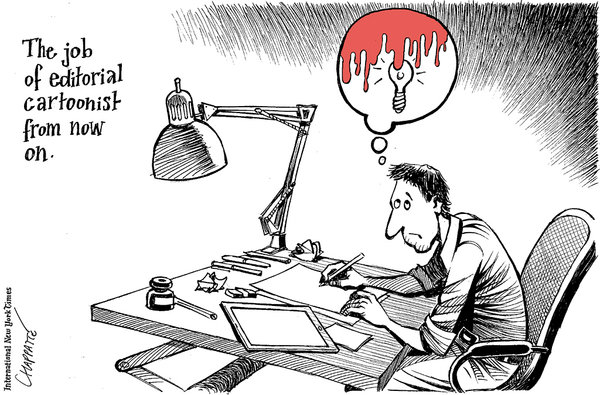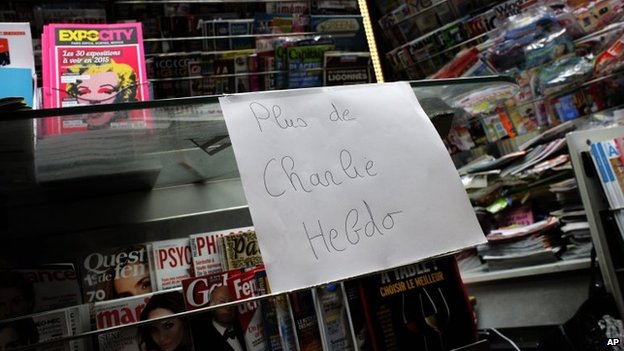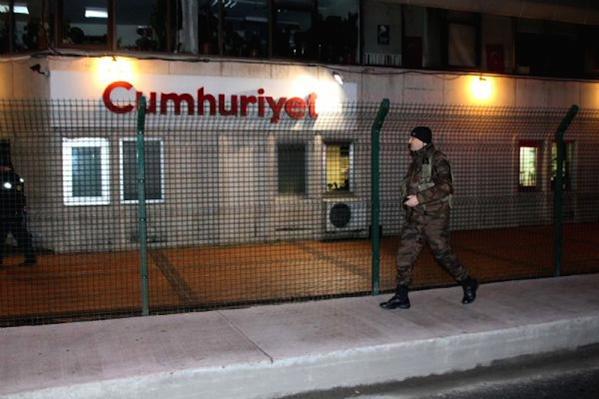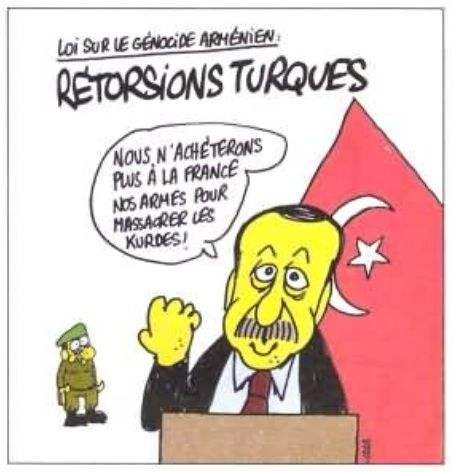VICKEN CHETERIAN
The reaction in European media to the horror of the Charlie Hebdo massacre was solidarity with the victims, defence of freedom of expression, and defiance against the terrorists. “Today, the entire Republic has been attacked,” declared French President François Hollande, “the Republic is the freedom of expression,” he added. Many commentators challenged the terrorist attacks, defying their violence and insisting that they would continue to value freedom of expression, as a basic tenant of the rule of law. The best illustration of this is to look at the numerous cartoons that were published following the Paris attack where the pen was challenging a Kalashnikov.
“The murder of Charlie Hebdo staff is an assault on freedom of expression. All organs of the press must resist it,” wrote an editorial of the British Independent.[1] From many sides there was a rush to defend the French satirical journal and its right to exercise its satire. Even Google - the Internet giant and a major competitor of print media - rushed to solidarity in the form of providing 250,000 EUR aid for this purpose[2].
Yet, it is not certain whether freedom of expression will survive without injuries. If we consider the way newspapers around the world behaved, they did say they would challenge the terrorists and their attacks, but in fact they did not. Despite their defiant posture, “no editor has gone as far as printing the images of the prophet Mohammad published by the French satirical magazine” writes Chris Boffey.[3]
Fear is already with us. After the Charlie Hebdo attack cartoonists will work with the images of the attack in their mind, especially when they work on controversial issues. This fear was best expressed by Patrick Chappatte in the New York Times in a cartoon entitled “After Charlie Hebdo” with a cartoonist at his desk looking worriedly at the blood flowing down to cover the flashing bulb of a new idea.[4]
Fear has been with us for a decade now, only the team of Charlie Hebdo were challenging it: The Danish paper Jyllands-Posten, which had published twelve cartoons in September 2005 considered as shocking as the Charlie Hebdo ones, and provoked demonstrations in a number of Muslim countries decided it would not publish the Charlie Hebdo cartoons. “It shows that violence works,” they said, and added: “We have lived with the fear of a terrorist attack for nine years, and yes, that is the explanation why we do not reprint the cartoons, whether it be our own or Charlie Hebdo’s,” Jyllands-Posten said. “We are also aware that we therefore bow to violence and intimidation,” wrote an editorial of the paper.[5]
Concretely, what emerges from this observation is that French and more generally European laws have practically ceased to apply in certain fields. In Europe one can make blasphemous remarks on various religions, including towards local majority religions, but not against what is perceived as blasphemous against Islam. In other words, we are creating a double legal reference: one follows the secular laws of France and other European countries, and Islamic laws interpreted by the Salafi-Jihadi mind-set judge the other: any act judged as blasphemous is punishable by death.
The cartoons managed to crystallize a deeper societal debate both within the European and global context. In Europe, migrant communities of Muslim origin have a host of socio-economic problems, to a degree that there are social spaces in Europe where Republican authorities, institutions, and their values are absent. Today, with the shocking attacks, the risk that the debate is hijacked by various European nationalisms is very serious, and it is not enough to make calls not to create an “amalgam” between self-styled Jihadists and larger communities of Muslim origin.
This fear is turning into censorship, pushing aside controversial, sensitive issues, and not just in their graphic representation. The politically correct discourse has left a vast space for the development of another one either justifying the attacks (“they should not have drawn such cartoons”, “they had already been warned once” etc.), or an anti-imperialist anti-colonialist discourse (referring to the French war in Algeria to explain current events, a war that ended in 1962!), or even outright conspiracy theories whereby imagining an “American and Zionist conspiracy” to divide France and weaken Europe.[6]
Politics and Terrorism
When the attack in Paris took place, I wondered what political objective such an attack could have? What is the interest of an armed group thousands of kilometres away – al-Qaeda in Yemen – to claim an attack against a little-known magazine with a circulation of 60,000 copies drawing cartoons in a foreign language? Al-Qaeda in Yemen is already in war with a number of its co-religionists and neighbours, why did it need to attack a foreign country? What was its motivation? What objectives did it hope to achieve from such an attack? What consequences would such an attack have on French foreign policy and on the complex on-going conflicts in the Middle East?
I remembered some years back when I was doing research on Jihadi volunteers in the Lebanese Bekaa Valley who had joined the Zarqawi network in Iraq. Afterwards, my contact said the following concerning the political immaturity of these groups: “Their problem is that they do not read newspapers.” Is it true that Jihadi groups are unable to read the political consequences of their violent crimes?
If the Jihadis themselves are unable to provide clear political demands for their acts, analysts should do the reading for the consequences of their violence. The only interpretation I can give is that various Salafi-Jihadi competing groups, al-Qaeda and Islamic State in Iraq and Syria, among others, need spectacular attacks that can attract media attention to reinforce their own legitimacy within this logic of inter-Jihadi competition. The Jihadist militants issued from European migrant communities, in their turn, imagine that they are in war with “Crusaders and Jews” but they are not. They are fighting against the secular state and its laws. And those forces that will emerge, in case the Jihadi attacks exacerbate public opinion even further, is not an equivalent of European religious radicalism, but extreme right nationalism. In France, the National Front is already seen as the winner in the aftermath of the attacks on Charlie Hebdo, what an irony of history that the sacrifice of a group of journalists, which carry the political culture of the 1968 movement, will profit French nationalism and the extreme right!
If jihadists do not have the habit to read newspapers, they tend to be even less interested in history. The European political and legal order is fragile, and emerged from two of the most horrific conflicts that have taken place in human history. We have just commemorated the 100th anniversary of the start of World War I, although Arab or Turkish media hardly noticed it. The jihadists with their ignorance and indiscriminate violence are awakening the most dangerous and criminal of political forces that have ever existed. And they are taking the migrant communities in Europe as hostage.
Today, Salafi-Jihadists are much more successful among youth from migrant communities, than, for example, during the attacks of September 2001. There are important sectors among these youth that are sensitive to Jihadi arguments, and consider attacks such as the one in Paris legitimate. In the Middle East too the Salafi-Jihadi political influence has spread: in 2001 they were confined to Afghan and Pakistani tribal regions. Today they are in the heart of the Arabo-Islamic world, and neighbours of Europe: in Iraq, Syria, Yemen, and Libya, among others.
Communities of migrant background from Arab and Muslim origins face a number of problems in Europe: discrimination, isolation, and the full weight of the economic crisis. The answer to this is to develop the necessary means of struggle that the legal system and political culture offers. When Cabu, Charb, Wollinski, Honoré, Tignous and others published “Charia Hebdo” they argued that they followed French laws, and not Islamic law, which permitted them to exercise their satire. Arabo-Muslim community leaders living in Europe should make a conscious choice about which legal system they want to follow: the republican laws in France, or that of Al-Qaeda in Yemen. This is not an easy task, but absolutely necessary today, if we, all of us, want to avoid falling hostage to Jihadists, and the rising nationalism in Europe. And our own growing fear and censorship will not help.
[1] http://www.independent.co.uk/voices/editorials/the-murder-of-charlie-hebdo-staff-is-an-assault-on-freedom-of-expression-all-organs-of-the-press-must-resist-it-9963612.html
[2] http://www.usatoday.com/story/tech/2015/01/08/google-charlie-hebdo/21446607/[3] http://www.thedrum.com/opinion/2015/01/09/charlie-hebdo-why-wont-british-newspapers-publish-cartoons
[4] http://www.nytimes.com/2015/01/10/opinion/patrick-chappatte-after-charlie-hebdo.html?_r=0[5] http://www.telegraph.co.uk/news/worldnews/europe/france/11334891/Charlie-Hebdo-attack-Jyllands-Posten-will-not-print-Prophet-Mohammad-cartoons.html
[6] http://alhayat.com/Opinion/Hazem-Saghieh/6739045 or see reactions to 2011 attack: http://www.lefigaro.fr/flash-actu/2011/11/03/97001-20111103FILWWW00390-charlie-hebdo-page-facebook-envahie.php





